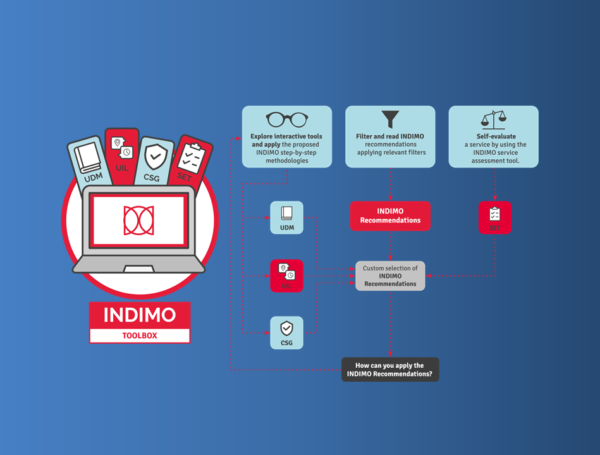by Andrés Kilstein, Floridea Di Ciommo and Gianni Rondinella at CambiaMo | changing mobility
Communities of practice building knowledge through co-creation
Since early project phases, the INDIMO Communities of practice started building knowledge through co-creation. The CoPs meeting were organised in each pilot sites with the experienced support from CambiaMo and the direct involvement of all pilot project leaders: Istituto Trasporti e Logistica, Imec, Technion, Coopcycle and door2door.
In the context of our research of digital mobility and delivery apps inclusiveness, 21 meetings of Communities of practice took place in the 5 different pilots sites with the purpose of sharing experiences and knowledge and to adapt current digital platforms, transport infrastructure and mobility services to target-groups of people vulnerable to exclusion. The CoPs aim is to engage participants in a routinary and dynamic process that unravels along time. Surfing the meetings, different methods were deployed to empower participation, share experiences and create common knowledge such as ice-breakers, role plays, open debates, instant polling, end-users requirements prioritization for the Universal Design Manual, and exercises of icons interpretation.
Each CoP corresponding to the each pilot co-created its own common knowledge, generated from sharing the different points of view of their participants. In Emilia-Romagna, there was a certain resistance towards digital solutions, associated to generational aspects and the populations’ mindset in rural contexts. With regards to the requirements of users towards the app, human assistance appeared as a number one priority for policy makers, end-users and stakeholders’ organizations. One of the learnings from the Antwerp CoPs is that there might be contradictory demands towards the service from different impaired people, and that different groups care about different functionalities. The big challenge emerges when the feasibility of thinking in universal terms may contradict specific requirements of a group. The debate is still open. In the Galilee pilot, the main learnings are related with the importance of security matters and trust for female users; the CoP addressed this aspect with the inclusion of driver’s ratings and open comments. Also, the possibility of registering through social networks (the connection of both environments) and the need to strengthen and re-orient the communication campaign to the specific target. In Madrid, the main ideas that emerged during the debate addressed the food delivery service and the values that it conveys, the actual and potential target audience and elements of usability of the adopted app itself. Finally, for Berlin, there was a great focus on transformation. Mobility change does not only mean leaving the private car, but also identify personal mobility of all people as a social need. The importance of understanding the perspective of the needs of women as caregivers was mentioned, especially because women mobility needs are still underrepresented in the discussions carried out at the transport organizations level.
Additional to local CoPs in pilot sites, in July and November of 2020, two Meta-CoPs took place online, with the participation of all the relevant local members of the partner organizations. During the first one, the main guidelines for the future local CoPs were agreed upon. During the second one a role play for solving potential conflicts emerged during CoPs was organised by CambiaMo and created bonds among partners who also worked “hands-on” with one of INDIMO’s citizen engagement tools.




